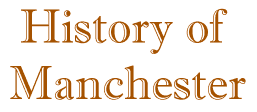| Manchester Town Guide |

 |
he origins of Manchester, the second largest city in England, lie in the Roman Empire. The city was first founded in the 1st century by the Romans, who called the city Mancunium. |
| After the Romans left, the area went into decline, and for the next few centuries there were just a few small settlements along the river. But then in the 14th century Manchester's future as an industrial centre was sealed with the arrival of weavers from Belgium. The town was soon a thriving commercial centre, which prospered through the wool and linen industries. As the industrial revolution got underway in the 18th century the city expanded rapidly to accommodate numerous other industries, and it became one of the most important cities in the UK. However, with the wealth that industrialisation brought there also came poverty, deprivation and suffering for the working classes. Manchester soon became known as a city plagued by social unrest, and it became a driving force in calls for social reform. In 1819 50,000 people met on St Peter's Field to protest about the unpopular Corn Laws. Government troops were called in to suppress the rally, and by the end of the day 11 people had been killed and more than 400 injured. This event became known as "Peterloo", and it only served to increase demands for reform. The city gradually became associated with socialists and it still retains a strong left-wing tradition to this day. Most famously Marx and Engels studied the social problems of Manchester in the 19th century, and this led them to write the Communist Manifesto as a solution to the problems. Throughout the 19th century and into the early 20th century, Manchester remained a thriving industrial centre. But like so many industrial towns Manchester suffered greatly during the depression of the 1930s, and from the subsequent decline in the manufacturing industries. For several decades Manchester had the reputation of a grim and derelict industrial town plagued by social and economic problems. But in the last couple of decades Manchester has undergone somewhat of a renaissance.... Old derelict buildings have been demolished and replaced by new ones, the canals have been re-vamped and the inner city has been given a dramatic facelift. Ironically one of the main impetuses for this renewal was also one of the saddest events in the city's recent history - the 1996 IRA bomb which destroyed much of the city centre. Amazingly enough no one was killed in the bomb, and the ever-resilient city took advantage of the destruction to build a new and rejuvenated city centre Even through the periods of economic decline, Manchester retained a distinct identity and culture of its own, and this is particularly evident today in the thriving cultural tradition and nightlife of the city. Today Manchester is one of the most vibrant cities in the UK, and it is well worth a visit. Concert halls, theatres, sports stadiums and night clubs all attest to the fact that Manchester is a city on the up. | |
| A | B | C | E | G | H | J | L | M | O | P | R | S | T | U | W |
Manchester Town Guide
Travel Advice | Accommodation in Manchester | Other Town Guides
-
Copyright © 1995 to 2016 Smooth Hound Systems
Smooth Hound Systems accepts no liability with regards to the accuracy of the information on this site.
Users are advised to double check information such as dates, times, prices etc.
